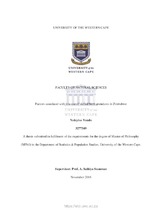| dc.description.abstract | Skilled birth attendance at childbirth is vital for decreasing maternal and child mortality in Zimbabwe. Infant mortality and maternal mortality in Zimbabwe are quite high due to low- use of skilled birth attendance. Based on different study sources, home delivery with complications are high, with many socio-economic and demographic associated factors including lack or no use of skilled birth attendance at childbirth in Zimbabwe. Therefore, the study looked at "preventive" which refers to an action taken to reduce or eliminate the probability of specific undesirable events or dangers from happening in the future and the present time in Zimbabwe. The objective of the study was to highlight the significance of the crucial function within the health systems of saving both the lives of a mother and the child. Furthermore to determine the frequent use of maternal health care services (skilled birth attendant) and identify factors affecting them. The data that was used was nationally represented large scale secondary data ZDHS of Zimbabwe with sample population n = 9,171. It was a secondary data that included all the provinces of Zimbabwe, simple random sampling was used that had questionnaires of both man, women and household questionnaires, these questionnaires helped in examining the socio-economic factors and determinants that leads to low-use of skilled birth attendants at childbirth. The prosed statistics analysis that were used were univariate, bivariate and multivariate techniques. The statistical analysis showed that demographic variables such age, place of delivery and socio-economic factors such as level of education of a mother and wealth index (occupation of a parent) and region has a significant effect on the use of skilled birth attendant during birth. Women with higher level of education were found to have high use rate of maternal health care services (Skilled birth attendants), while women with primary and secondary education were found to have high use rate of less ( traditional birth attendant) or no use of skilled birth attendant. Therefore, the female age at birth, place of delivery, level of education and wealth index played a major role in decision making about the importance of having a skilled birth attendant when giving birth. The access to skilled birth attendance was found to be a significant factor in reducing maternal and child mortality in Zimbabwe. Furthermore women need to be educated about the importance of maternal
health care services use and postnatal care and the department of health in Zimbabwe can implement mobile clinics for those who are residing far from health facilities. | en_US |

